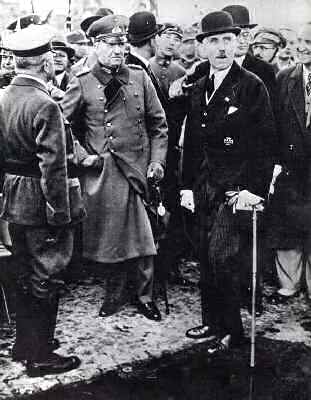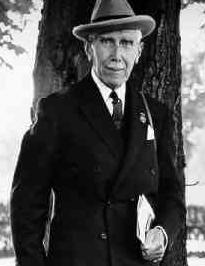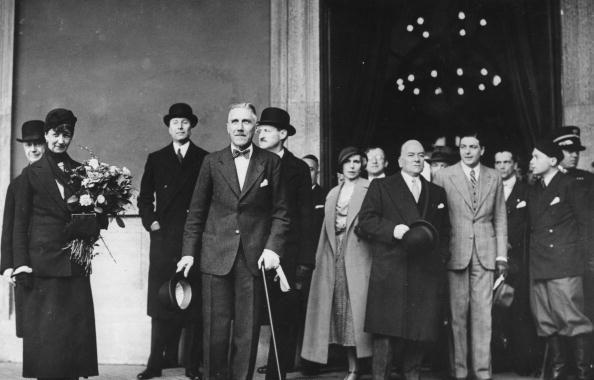Franz von Papen
From Kaiserreich
MaskedPickle (Talk | contribs) |
MaskedPickle (Talk | contribs) (→Weltkrieg) |
||
| Line 10: | Line 10: | ||
=== Weltkrieg === | === Weltkrieg === | ||
| + | |||
| + | Although it has always been denied by Von Papen himself, he reportedly acted as a spymaster while in the United States, organizing economic espionage against Allied war efforts in Europe by means of attempting to purchase all available explosive substances, to prevent their use against the German war effort. On December 28, 1915, after the [[RMS Lusitania incident]] he was declared persona non grata by the U.S. after his exposure and recalled to Germany. En route, his luggage was confiscated, and 126 check stubs were found showing payments to his agents. Papen went on to report on American attitudes to both General [[Erich von Falkenhayn]] and the Emperor [[Wilhelm II]]. In April 1916, a United States federal grand jury issued an indictment against Papen for a plot to blow up [[Canada]]'s Welland Canal, which connects Lake Ontario to Lake Erie, but Papen was safely on German soil; he remained under indictment until he became Reichskanzler, at which time the charges were dropped. During the Weltkrieg, Papen served as an officer first on the Western Front and then from 1917 as an officer on the Grosser Generalstab in the Middle East and as a major in the [[Ottoman Empire|Ottoman]] army in Palestine, and later as colonel during the Italian offensive. Papen also served as intermediary between the [[Ireland|Irish]] rebels and the German government regarding the purchase and delivery of arms to be used against the British during the Easter Rising of 1916, as well as serving as an intermediary with the [[Princely Federation|Indian]] nationalists. After achieving the rank of colonel, he returned to Germany and left the army in 1920. | ||
=== Hot spot ambassador === | === Hot spot ambassador === | ||
Revision as of 22:14, 22 July 2008
Franz Joseph Hermann Michael Maria von Papen (born in October, 29 1879 at Werl, Germany) is a German politician. After years of service within the German diplomacy, mainly as State Secretary for Foreign Affairs, he succeeded Generalfeldmarschall Oskar von Hutier is his office of German Reichskanzler after the latter's fatal disease. Since June, 1 1934, Franz von Papen is the tenth and current Imperial Chancellor of Germany, thus head of the government of one of the most powerful countries in the world.
Contents |
Biography
Before the Weltkrieg
Son of Friedrich Franz Michael von Papen and Anna Laura von Steffens, wealthy Westphalian Catholic landowners, Franz von Papen was educated as an officer, attending various military schools, to the Bensberg Cadet Academy, from 1891 to 1895, and in the Lichtenfelder Military Academy from 1895 to 1898, where he took advantage from the nearness to Berlin to visit regularly the city museums and theatres. He then chose to join the cavalry, entering Dusseldorf Cavalry School in 1898, commissionned to the 5th Westphalian Uhlan regiment, stationed in Dusseldorf. Trained as a lancer, he then went to the Hanover Cavalry Riding School in 1902, spending a lot of time in England. After his wedding with Martha von Boch-Gelbau in 1905 and the birth of his first daughter, he then pursued his ambition of entering the Great General Staff, finally managing to enter the Berlin Staff Academy in 1908, selected along with 150 other young officers for a trial period in April 1911, being exposed to the theories of military writer Friedrich von Bernhardi. In 1913, Papen completed his training and was promoted captain, and soon afterwards named as military attaché to USA and Mexico, arriving in the first country in January 1914, and observing the Mexican Revolution. He was returned at Washington D.C. then the Weltkrieg broke out.
Weltkrieg
Although it has always been denied by Von Papen himself, he reportedly acted as a spymaster while in the United States, organizing economic espionage against Allied war efforts in Europe by means of attempting to purchase all available explosive substances, to prevent their use against the German war effort. On December 28, 1915, after the RMS Lusitania incident he was declared persona non grata by the U.S. after his exposure and recalled to Germany. En route, his luggage was confiscated, and 126 check stubs were found showing payments to his agents. Papen went on to report on American attitudes to both General Erich von Falkenhayn and the Emperor Wilhelm II. In April 1916, a United States federal grand jury issued an indictment against Papen for a plot to blow up Canada's Welland Canal, which connects Lake Ontario to Lake Erie, but Papen was safely on German soil; he remained under indictment until he became Reichskanzler, at which time the charges were dropped. During the Weltkrieg, Papen served as an officer first on the Western Front and then from 1917 as an officer on the Grosser Generalstab in the Middle East and as a major in the Ottoman army in Palestine, and later as colonel during the Italian offensive. Papen also served as intermediary between the Irish rebels and the German government regarding the purchase and delivery of arms to be used against the British during the Easter Rising of 1916, as well as serving as an intermediary with the Indian nationalists. After achieving the rank of colonel, he returned to Germany and left the army in 1920.
Hot spot ambassador
State Secretary for Foreign Affairs
Reichskanzler

Political career
- Military attaché to United States and Mexico (1913-1916)
- German ambassador to Dublin, Ireland (1921-1923)
- German ambassador to Rome, Italian Federation (1923-1925)
- German ambassador to Hyderabad, Princely Federation (1925-1927)
- German ambassador to Washington D.C., United States (1927-1930)
- State Secretary for Foreign Affairs (1930-1934)
- Member of Parliament for Westphalia (1931-...)
- Imperial Chancellor of Germany(1934-...)
Papen's cabinet June, 1 1934 - ...
- Franz von Papen - Imperial Chancellor
- Count Friedrich Werner von der Schulenburg - State Secretary for Foreign Affairs
- Hans von Seeckt - State Secretary for War, Chief of the German General Staff
- Count Johann Heinrich von Bernstorff - State Secretary for Interior
- Hjalmar Schacht - State Secretary for Finance
- Count Johann Schwerin von Krosigk - State Secretary for Economics and Labour
- Ernst Trendelenburg - State Secretary for Justice
- Ludwig von Reuter - State Secretary for Navy, Commander of Kaiserliche Marine
- Hermann Göring - Governor of Freistadt Mittelafrika
- Alexander von Falkenhausen - Governor of Allgemeine Ostasiatische Gesellschaft
Personal life
The Reichskanzler has 4 siblings and married Martha von Boch-Galbau in May 1905, daughter of a wealthy industrialist: together, they had five children: Antoinette (born in 1906), Isabella, Margaret, Friedrich Franz and Stephanie Marie Antoinette.


